Readers Question: How reliant is the UK economy on oil?
There are two ways of considering this question – the consumption and production of oil.
- Firstly, how much does the UK need to consume oil to maintain economic activity? Could we survive in a post-oil economy?
- Secondly, how important is the UK oil industry and the production of oil?
Consumption of oil
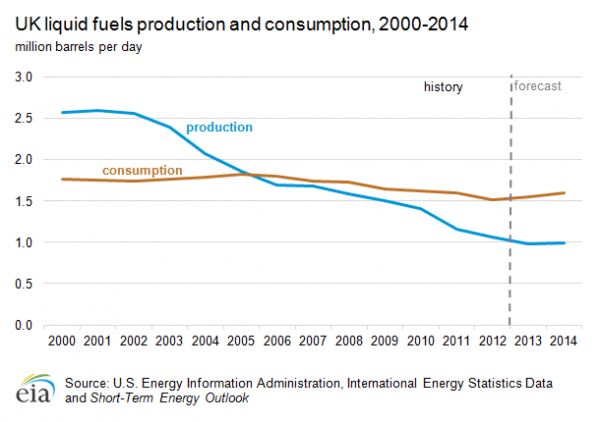
- Transport – cars, lorries e.t.c. mostly rely on petrol / diesel. (In the US transport accounts for 66% of all oil used. I imagine it is a similar statistic in the UK.)
- Production of plastic
- Fertilizers
- Asphalt
- Polyurethanes
- Solvents
- Electrical generation
Reducing dependency on oil consumption
- There have been some attempts to reduce the dependency on oil. In transport, the government have encouraged the consumption of electric cars, with subsidies and encouraging electric car charging points. But, between between 2010 and June 2013 only 5,034 electric cars have been registered. It is a small drop compared to the total number of cars sold.
- According to Calor, there are 160,000 LPG registered cars in the UK, and the number is on the rise.
- Energy efficiency. Cars have become more energy efficient with a high miles per gallon becoming a strong selling point. This has limited the growth in demand for petrol.
- Alternative forms of transport. Some see alternative forms of transport as a way to avoid reliance on oil based fuels. However, despite growth in cycling rates and increased use of trains, cars / lorries still dominate the UK’s mode of transport.
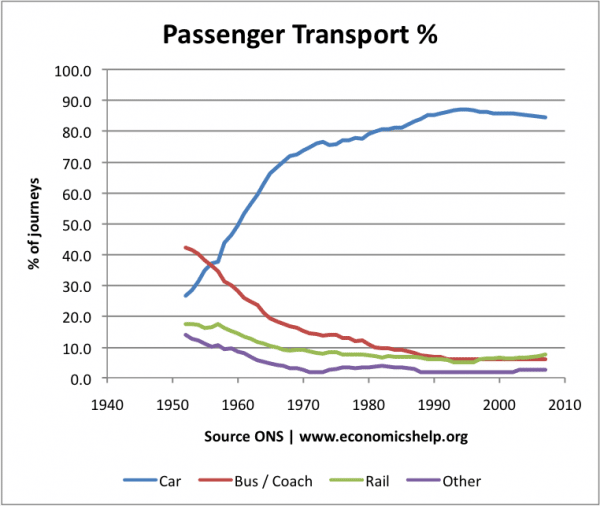
However, the improvements in energy efficiency and attempts to introduce alternative fuel cars are only limiting the growth in demand for oil based fuel.
Production of power
In the production of electrical power, the UK is not reliant on petroleum products. We are mostly reliant on natural gas and coal.
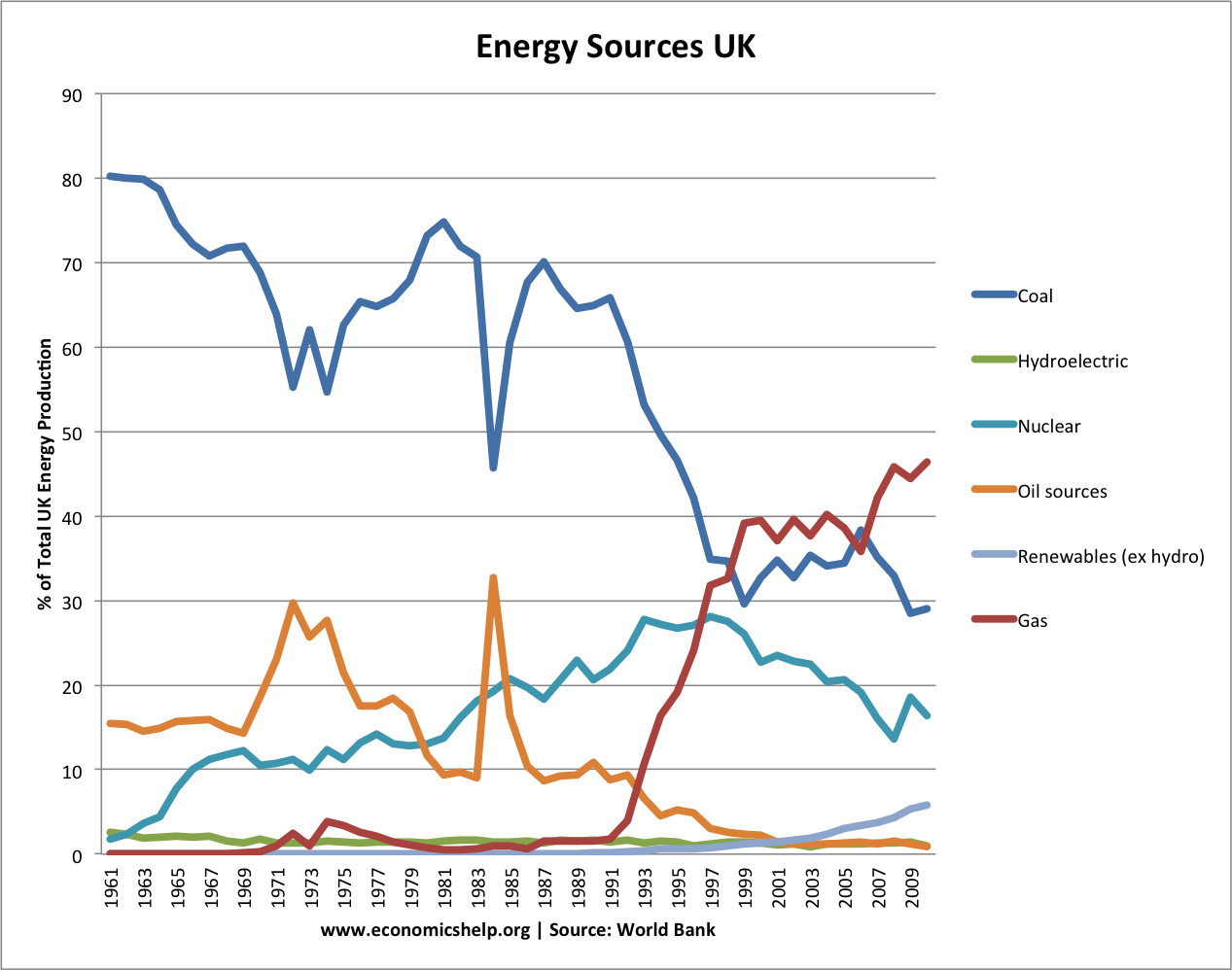
Renewable energy sources are growing, but are still a small % of total energy sources.
Total energy sources
If we look at the source for all energy (not just electricity production) oil based fuels account for 38% of the UK’s energy needs
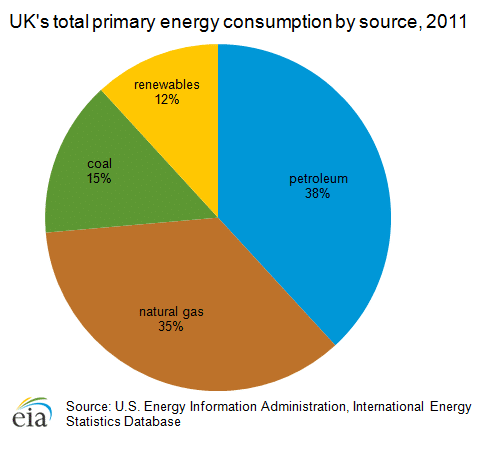
Source: EIA
How important is oil production for the UK economy?
In 2008, the UK was the world’s 19th largest oil producer. Oil production from the North Sea peaked in the late 1980s, and is now on a downward trend. But, it still gives an important contribution to the UK economy. Nevertheless, the UK is no longer a net exporter of oil, we are now a net importer. In 2012, the 1,311,000 reports around 37% of UK oil is imported.
In 2009, we imported a total of 1,450,000 barrels a day. In 2009, we exported 1,311,000
But, net imports have risen in recent years. According to EIA, in 2012, we imported a net 494,100 barrels a day. EIA
Nevertheless, oil still plays an important role in the UK economy.
- Tax revenue from oil in the past 40 years £271 billion (2008 money)
- Oil production helps the UK current account. Without the production of oil, we would have to import more and this would worsen the current account, and quite likely reduce the value of the Pound.
Conclusion
The UK economy is heavily reliant on oil based fuels for the transport sector. Without petrol / diesal, the UK economy would be seriously damaged because it would be unable to transport goods and people. There have been efforts to diversify energy sources, but currently we still rely very heavily on petrol.
In electricity generation, oil plays a very small role, but we are still reliant on the fossil fuels of gas and coal.
The UK has seen many benefits from oil production in terms of tax revenues, improved balance of payments. However, with north sea oil production peaking, this benefit is forecast to diminish and we will have to get used to becoming a major importer of oil.

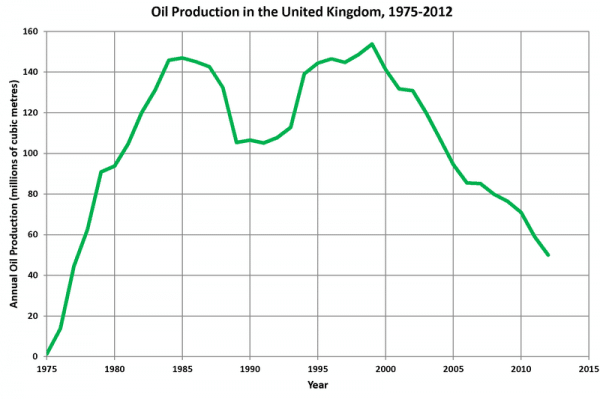
The list of the usage of oil, leaving aside the fact that polyurethanes are plastics (and in some ways so is asphalt) which I think comes from your source, would benefit if you could attach some numbers. It would point out the error of focusing on trying to reduce the use of plastic bags for environmental reasons. That is like trying to sort out an in growing toe nail when your arm is hanging off. The big consumption is in transport and heating – which impact on people very immediately and so are generally ignored in favour of targeting a very minor issue that people think is not so important. If we want to get serious about oil we should target transport and heating (insulation). It is where the consumption is, and where the biggest benefits could be obtained.
As always a great post explained simply but I was wondering if you know whether the trends shown in the graphs have continued in recent years?
For example, your chart on transport stops before the recession; I wonder whether this had any impact on transport usage or at least whether the recent trend of car slowly falling with the others slowly increasing has continued.
Also I wonder whether you have a more recent chart on electricity generation to take account of the big changes of the last couple of years eg shale gas in the US resulting in more coal being used in the UK, renewables being responsible for 14.8% of generation in 2013 (and 18% in Q4) according to latest government ‘energy trends’ statistics etc.